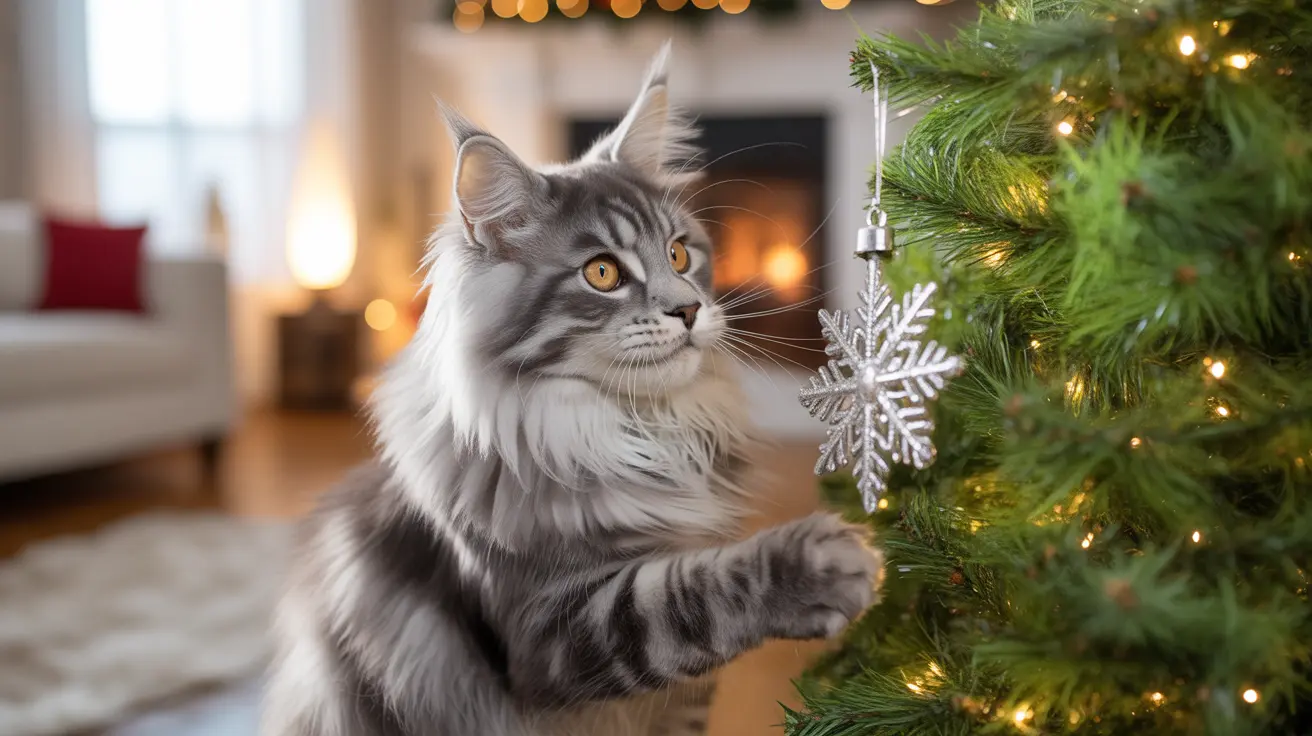As the holiday season approaches, many pet parents wonder about the safety of their festive decorations, particularly whether Christmas trees pose a risk to their feline friends. While Christmas trees aren't severely toxic to cats, they can present various health and safety concerns that every cat owner should understand.
In this comprehensive guide, we'll explore the potential risks Christmas trees pose to cats, identify warning signs of toxicity, and share expert strategies to create a safer holiday environment for your beloved pets.
Understanding Christmas Tree Toxicity for Cats
Most live Christmas trees, including popular varieties like fir, spruce, and pine, contain oils that can be mildly toxic to cats. While these trees aren't typically lethal, they can cause uncomfortable symptoms if your cat decides to make them a snack.
The main concerns with real Christmas trees include:
- Tree oils that can irritate your cat's mouth and stomach
- Sharp needles that may cause internal injuries if swallowed
- Sap that can cause gastrointestinal upset
- Tree water that may contain harmful preservatives or bacteria
Common Symptoms of Christmas Tree Exposure
If your cat has been nibbling on your Christmas tree or drinking the tree water, watch for these warning signs:
- Excessive drooling
- Vomiting or diarrhea
- Decreased appetite
- Lethargy
- Pawing at the mouth
- Signs of abdominal discomfort
Artificial vs. Real Christmas Trees: Safety Comparison
While artificial trees don't contain toxic oils, they come with their own set of risks. Plastic needles can cause intestinal blockages if swallowed, and some artificial trees may be treated with chemicals that could be harmful to cats.
However, artificial trees generally pose fewer health risks than real trees, making them a safer choice for households with curious cats.
Making Your Christmas Tree Cat-Safe
Secure Tree Setup
Start with a sturdy base and consider anchoring your tree to the wall to prevent tipping. Place the tree in a corner to limit access and create a stable environment.
Safe Decorating Strategies
Choose your decorations wisely:
- Avoid tinsel completely
- Use shatterproof ornaments
- Place decorations higher on the tree
- Secure ornaments firmly
- Cover or block access to the tree water
- Use pet-safe cord protectors for lights
Creating a Cat-Free Zone
Consider these deterrent methods:
- Place aluminum foil around the tree base
- Use citrus scents as natural deterrents
- Create physical barriers with pet gates
- Provide alternative entertainment for your cat
Emergency Response Plan
If you suspect your cat has been affected by your Christmas tree, take these immediate steps:
- Remove your cat from the tree area
- Check for visible injuries
- Monitor their behavior closely
- Contact your veterinarian if symptoms appear
- Save any evidence of what was consumed
Frequently Asked Questions
Are Christmas trees poisonous or toxic to cats, and what are the symptoms of exposure?
Christmas trees are mildly toxic to cats. Symptoms include drooling, vomiting, diarrhea, and decreased appetite. While rarely fatal, exposure can cause significant discomfort and should be taken seriously.
How can I cat-proof my Christmas tree to keep my cat safe during the holidays?
Secure the tree to prevent tipping, use shatterproof decorations, avoid tinsel, cover the tree water, and consider using deterrent sprays or physical barriers. Creating alternative play spaces can also help keep cats away from the tree.
What should I do if my cat drinks water from the Christmas tree stand or chews on tree needles?
Monitor your cat for symptoms of illness and contact your veterinarian if they show signs of distress. Clean fresh water should always be available as an alternative to tree water.
Are artificial Christmas trees safer for cats than real ones, and what new risks do they present?
Artificial trees are generally safer regarding toxicity but can still pose risks if cats chew on or swallow synthetic materials. The main risks include intestinal blockages and potential exposure to manufacturing chemicals.
What holiday decorations and festive plants should I avoid to prevent poisoning or injury to my cat?
Avoid tinsel, string lights within reach, glass ornaments, and toxic holiday plants like poinsettias, mistletoe, and lilies. Also keep away chocolate decorations and any items with small parts that could be swallowed.
By following these guidelines and remaining vigilant, you can create a festive environment that's safe for both your holiday spirit and your feline family members. Remember that prevention is always better than treatment, so take time to properly cat-proof your Christmas decorations before any accidents occur.






